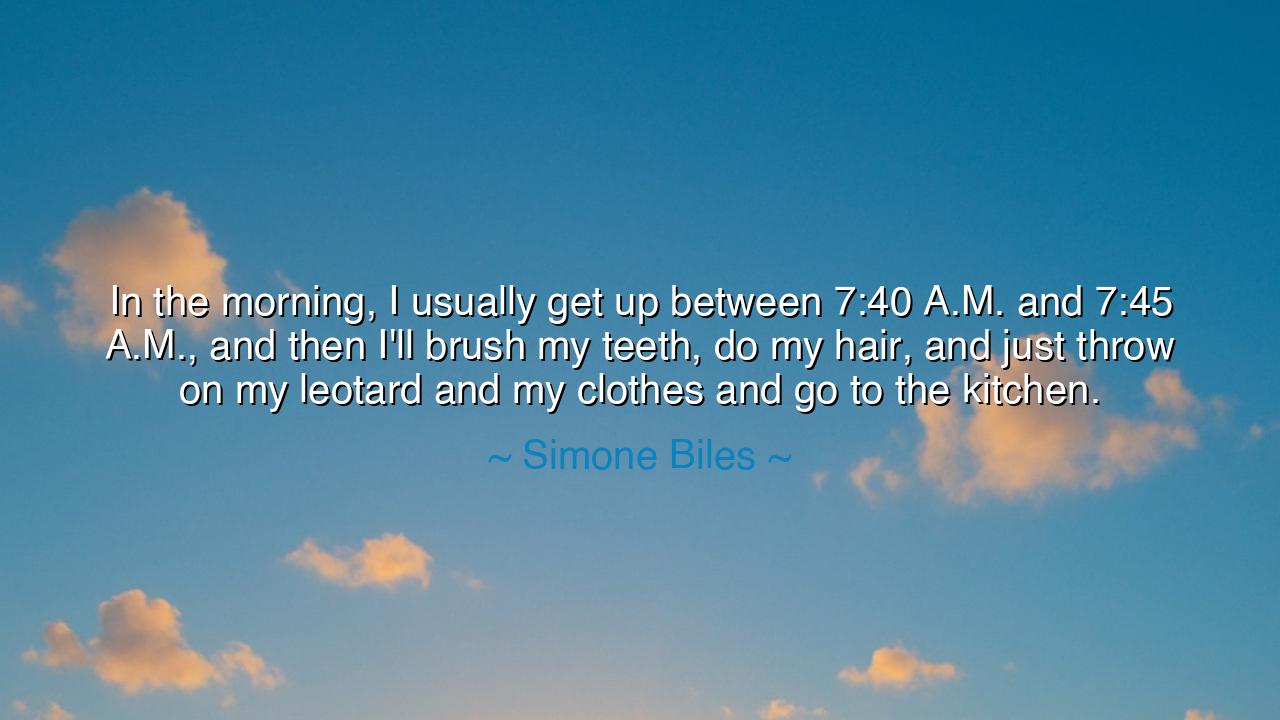
In the morning, I usually get up between 7:40 A.M. and 7:45
In the morning, I usually get up between 7:40 A.M. and 7:45 A.M., and then I'll brush my teeth, do my hair, and just throw on my leotard and my clothes and go to the kitchen.






Children, gather close and listen well, for I bring to you a story of discipline, of routine, and of the quiet strength that arises from the everyday actions that we take. In the words of Simone Biles, we hear the foundation of greatness built not upon grand gestures, but upon the small, consistent rituals that structure the day. She says, "In the morning, I usually get up between 7:40 A.M. and 7:45 A.M., and then I'll brush my teeth, do my hair, and just throw on my leotard and my clothes and go to the kitchen." These words, though simple in their content, reflect the essence of what it means to live with purpose, focus, and dedication—for even in the smallest moments, the seeds of greatness are planted.
In the quiet of the morning, Biles' routine reveals the deep discipline required to be at the top of one’s craft. She rises, not out of obligation, but out of a deep understanding that each day begins with a foundation, a structure, upon which the rest of the day can be built. The act of brushing her teeth, doing her hair, and donning her leotard are not just trivial tasks, but part of a greater practice—the practice of preparation, of mentally and physically readying herself for the challenges ahead. Just as a warrior would prepare his armor before battle, so does Biles prepare herself for the day’s work.
Consider the great philosophers of old, children—men like Socrates and Aristotle—whose lives were structured by daily routines. Socrates, though often depicted in philosophical debates, was a man who understood the importance of simplicity and ritual in everyday life. His thoughts were not scattered, nor did he live chaotically. His routines, though not detailed in the same way as Biles', provided a framework within which his wisdom could flourish. Aristotle, too, had a disciplined approach to his life, focusing on the everyday pursuit of knowledge and virtue. Through their rituals, they laid the foundation for their greatness, building each day upon the quiet routines that shaped their minds and hearts.
In the same way, Biles' morning routine speaks to the power of small, seemingly mundane actions that, when performed consistently, lead to mastery. The leotard, her chosen uniform, is a symbol of her dedication—it is not merely clothing but a reminder of the path she has chosen, the sport she has committed her life to. Her routine in the morning, though it may seem like nothing more than simple preparation, is part of the mental training that carries her through her career. Every action, from brushing her teeth to eating breakfast, is part of the ritual that prepares her to step into the world of gymnastics, where focus and precision are paramount.
Think of the great warriors who before battle would gather their armor, sharpen their swords, and mentally prepare for the trials ahead. Alexander the Great, though famed for his military prowess, was deeply connected to his routine. He began each day with training and strategy, ensuring that his mind and body were prepared for the challenges he would face. Like Biles, he understood that victory was not won by grand gestures alone, but by the small, consistent actions that built his strength, his focus, and his will. Biles' daily practice, though not on the battlefield, mirrors the warrior’s discipline—it is in the quiet rituals that she prepares herself for the extraordinary.
The lesson, children, is this: Do not underestimate the power of routine. The small acts that you perform every day—whether it is brushing your teeth, preparing for the day, or engaging in your chosen pursuits—form the foundation of your life. Each day is an opportunity to build upon your strengths, to prepare for the challenges ahead, and to focus your mind and body on the greatness you seek. Biles' routine reminds us that greatness is not born in one moment, but is crafted over time through consistent, purposeful action.
So, I charge you now, young ones: Embrace your daily rituals, and see them not as obligations but as the stepping stones to your greatness. Just as Biles' preparation in the morning sets her up for the extraordinary feats she accomplishes, so too can your own routines lay the groundwork for the life you seek to create. Each day, commit to the small things, knowing that they are the foundation upon which your dreams and your future will be built. The path to greatness lies not in grand gestures, but in the quiet, consistent actions of everyday life.






AAdministratorAdministrator
Welcome, honored guests. Please leave a comment, we will respond soon